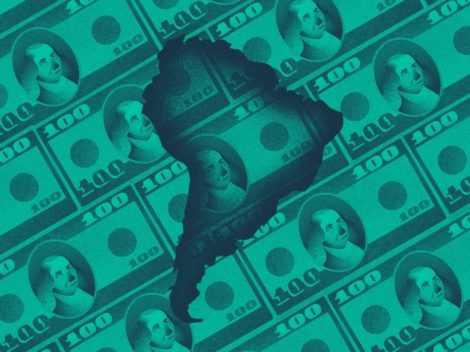There are always startups waiting in the wings to be the next “insert company name here.” In the case of Robinhood, the stock-trading app valued at $20 billion, there is a growing list of retail-trading competitors who are raising significant venture funding and gaining traction.
Subscribe to the Crunchbase Daily
One of them is investment social network Public.com, which also offers zero-commission and fractional stock trades via a smartphone app. The company is now valued at $1.2 billion following a $220 million Series D investment announced yesterday. Investors in the deal included existing backers Accel, Greycroft and Lakestar, as well as Intuition Capital, Tiger Global, Mantis VC, Dreamers VC, Inspired Capital, Vine Capital Partners, Aglaé Ventures and Phil DeFranco.
The flurry of news around Robinhood seems to change every day following late January, when the company faced an extraordinarily high volume of trading after individual investors drove up shares of video game retailer GameStop, and a handful of other stocks, in a kind of retaliation against hedge funds they claimed were shorting those shares.
It caused such a bruhahaha that a Twitter firestorm erupted from investors blaming the company for shuttering trades before they were able to get in. In the course of a few days, Robinhood raised $3.4 billion in fresh venture funding to shore up its balance sheet amid heavy trading volume.
Now the U.S. House Financial Services Committee intends to hold a hearing around the GameStop fiasco Feb. 18, Axios reported earlier this week.
How Robinhood works
Robinhood changed online trading when it came onto the scene in 2013, offering free trades and ushering in a new era of retail stock trading by amatuer investors.
To date, the Menlo Park, California-based company has raised $5.6 billion in known funding, according to Crunchbase data. This includes $3.5 billion, led by Ribbit Capital, in 2021 alone. Last August, the company was valued at $11.2 billion, and it’s now valued at almost double that, according to Crunchbase data.
How does Robinhood make money? In five ways, according to the company:
- Rebates from market makers and trading venues: When buying or selling through your brokerage account, your orders are sent to market makers for execution. They offer rebates to brokerages.
- Investing tools
- Stock loans
- Income generated from cash: Uninvested cash is put into interest-bearing bank accounts.
- Interchange fees: Interchange fees are earned by most debit and credit card issuers and are meant to cover things like transaction processing and fraud loss.
In order to open a Robinhood account, you have to be 18 years old or older, have a valid Social Security Number, have a legal U.S. residential address within the 50 states or Puerto Rico and be a U.S. citizen, U.S. permanent resident or have a valid U.S. visa.
The company also gathers personal information, including financial and tax identification information, to comply with U.S. government laws and FINRA rules.
Robinhood has more than 5,000 stocks to choose from, and there are account restrictions that include keeping an account equity of $25,000 or more if you day trade.
Who’s next?
With Robinhood having a big share of the market, one of the lingering questions was if venture capitalists would be willing to fund competitors. The answer, as we especially learned this week, is “yes.”
Of known investments into 129 companies, investors infused $6.9 billion into companies labeling themselves as a stock exchange and trading platform, according to Crunchbase data. Robinhood is the leader in that group, accounting for $5.5 billion of the total funding raised by such companies. Between 2016 and 2020, 161 investments were made totaling approximately $3 billion.

Public.com’s recent investment comes two months after the New York-based company raised a $65 million Series C. It has now raised a total of $310 million.
Public also said Wednesday that it has amassed 1 million members just 18 months after launching. Though the company didn’t say how much of that was in the past few months, there is no doubt what happened in the market a few weeks ago probably boosted Public’s appeal and most likely propelled it to be Robinhood’s chief rival.
Further separating it from Robinhood, Public announced its decision on Feb. 1 to eliminate Payment for Order Flow (PFOF) from its business model. Brokerages engaged in PFOF receive rebates on trades routed through its clearing firm (See No. 1 on the above list of how Robinhood makes money).
The main criticism of PFOF, according to Public, is that it “creates misalignment between the financial aims of the brokerage and the interests of its clients.” Public is now collecting optional tips from users in exchange for executing their orders.
Tipping is not the only revenue source for Public. Similar to Robinhood, it makes interest off of uninvested cash balances. One difference between it and Robinhood is that the Public’s clearing firm, Apex, lends shares to investors and institutions that need or want to borrow them. There is also a future option for Public to charge a subscription fee for paid-for premium features.
“We believe optional tipping is one of the most empowering, transparent ways for us to monetize — the decision is now in our members’ hands — and will bring us one step closer to our mission to open the stock market to everyone,” the company said in its blog post.
In addition to Public, well-funded companies hot on Robinhood’s heels include:
- Coinbase, a crypto trading competitor that has raised $547.3 million in known capital to date from investors like a16z, IVP and Tiger Global, and
- eToro, an Israel-based social trading and investment marketplace, which raised $272.7 million in known capital to date from backers like CommerzVentures and Spark Capital
There are also some up-and-coming companies that raised within the past six months, such as social investment platform CommonStock, which raised $9.7 million last fall. Vested Finance, which is developing an avenue for Indian investors to invest in the U.S. stock market, has also raised $3.6 million in seed funding.
Some are also overseas: Flink, based in Mexico City, raised $12 million in a Series A round earlier this month. And the Community Fund’s Lolita Taub and Calanthia Mei are backing Baraka, an open investing ecosystem in Dubai.
“Community and cultural context is key to succeeding in international markets,” Taub said via email. “Baraka knows this and has set out to empower young investors in the Middle East by giving them the tools to take control of their investments. Keep an eye on them. They are the retail investor platform the region’s been waiting for — the Robinhood in the Middle East.”
Illustration: Dom Guzman

Stay up to date with recent funding rounds, acquisitions, and more with the Crunchbase Daily.


![Illustration of a man sitting on a huge pile o' money. [Dom Guzman]](https://news.crunchbase.com/wp-content/uploads/Giant_Funding-470x352.jpg)

![Illustration of toast with $ toasted in. [Dom Guzman]](https://news.crunchbase.com/wp-content/uploads/Forecast-dollar-sign-300x168.jpg)

![Illustration of a unicorn with a green money background. [Dom Guzman]](https://news.crunchbase.com/wp-content/uploads/Unicorn_Money_v1-300x168.jpg)


67.1K Followers